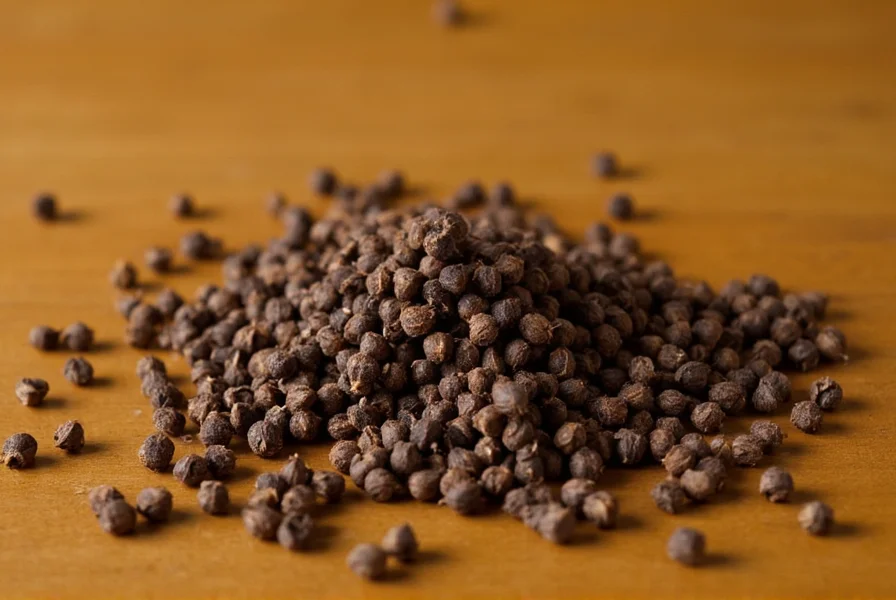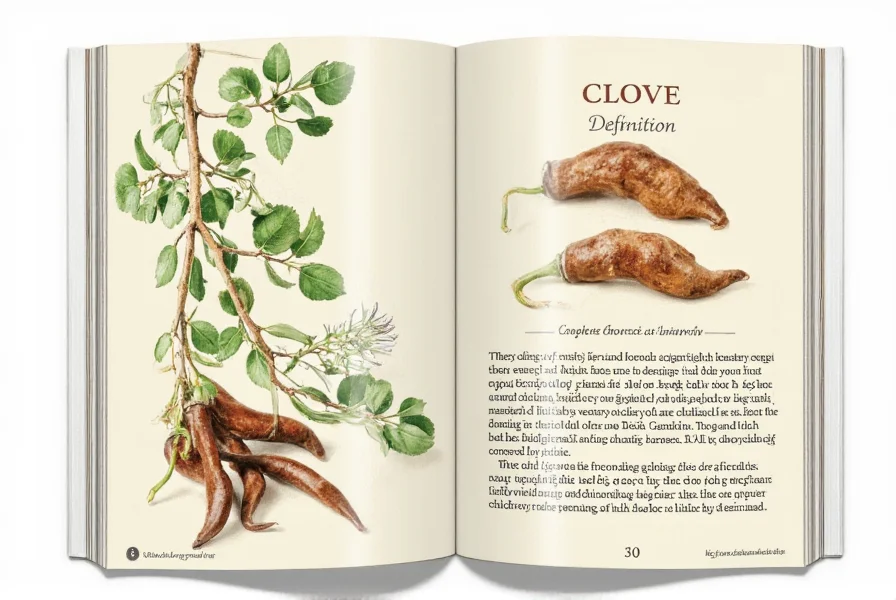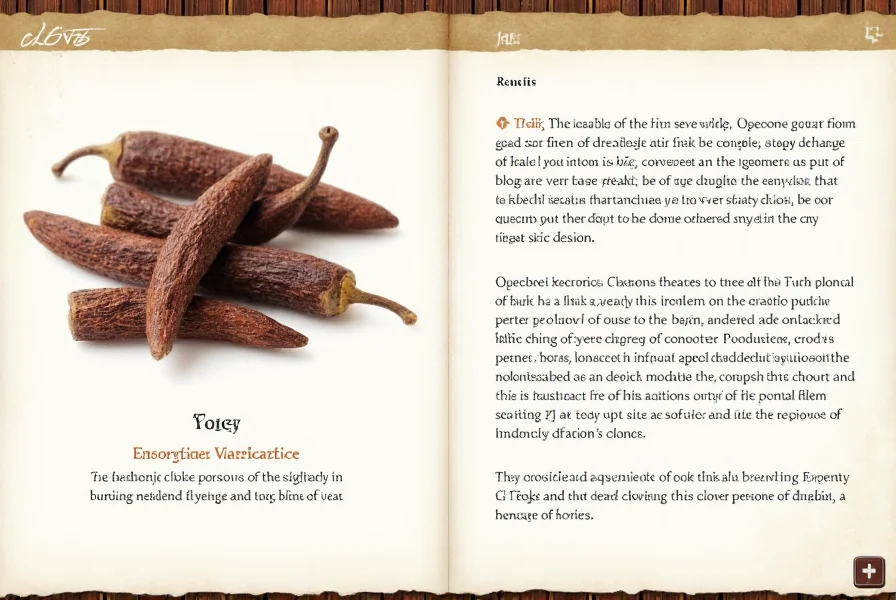Understanding the precise clove definition helps culinary enthusiasts, herbal medicine practitioners, and botany students appreciate this versatile spice. Cloves represent one of the oldest known spices, with historical records showing their use dating back thousands of years across multiple civilizations.
Botanical Classification and Physical Characteristics
Syzygium aromaticum, formerly classified as Eugenia caryophyllata, belongs to the Myrtaceae family. This evergreen tree can reach heights of 8-12 meters when mature. The distinctive spice we call "clove" specifically refers to the unopened flower buds harvested before they bloom.
Each clove measures approximately 1-2 cm in length and features:
- A slender stem (the "nail" portion)
- An expanded, four-lobed head containing the unopened petals
- A rich brown color when properly dried
- A strong, penetrating aroma
| Feature | Description |
|---|---|
| Scientific name | Syzygium aromaticum |
| Family | Myrtaceae |
| Native region | Moluccas (Spice Islands) of Indonesia |
| Active compound | Eugenol (70-90%) |
| Harvest timing | When buds turn from green to pink, before opening |
Differentiating True Cloves from Similar Terms
When exploring the complete clove meaning, it's essential to distinguish between:
- True cloves - The dried flower buds of Syzygium aromaticum
- Garlic cloves - Individual segments of a garlic bulb (Allium sativum)
- Clove oil - Essential oil extracted from true cloves
- Clove cigarettes - Tobacco products containing clove flavoring (different from the spice itself)
This distinction represents a common point of confusion in the precise clove definition explanation. When people reference "clove" in culinary or medicinal contexts without specification, they typically mean the Syzygium aromaticum flower buds.
Historical Significance and Global Trade
The historical clove definition extends beyond mere botany. Ancient Chinese records from the 3rd century BCE mention cloves as a breath freshener used by those addressing the emperor. Arab traders controlled the clove trade for centuries, spreading these spices throughout the Middle East and Europe.
During the Age of Exploration, cloves became so valuable that European powers fought wars to control the Spice Islands where they grew exclusively. The Dutch once destroyed entire clove-producing trees on islands they didn't control to maintain monopoly pricing—a testament to the economic importance of understanding the true clove definition in historical contexts.

Modern Production and Quality Grading
Today, Indonesia, Madagascar, and Tanzania produce approximately 80% of the world's cloves. The harvesting process remains largely unchanged for centuries:
- Workers hand-pick buds when they turn from green to pink
- They spread the buds on mats in the sun to dry for 4-6 days
- Properly dried cloves snap cleanly when bent
Quality grading considers several factors that contribute to the comprehensive clove definition:
- Whole vs. ground - Whole cloves retain flavor longer
- Moisture content - Should be below 12% for proper storage
- Eugenol percentage - Higher concentrations indicate better quality
- Color - Rich reddish-brown indicates proper drying
Culinary Applications of Cloves
Understanding the practical clove definition reveals why this spice remains popular worldwide. Cloves feature prominently in:
- Pumpkin spice blends
- Ham glazes and roasts
- Indian garam masala
- Moroccan spice mixtures
- German pickling recipes
- Traditional mulled wines and ciders
Chefs appreciate cloves for their intense flavor that requires careful measurement—typically just 1-2 whole cloves suffice to flavor an entire dish. The spice's high eugenol content makes it incompatible with certain materials; never use aluminum cookware with cloves as chemical reactions can occur.
Medicinal Properties and Traditional Uses
The therapeutic clove definition encompasses centuries of traditional medicine applications. Modern research supports several traditional uses:
- Dental applications - Eugenol's numbing properties make clove oil effective for temporary toothache relief
- Antimicrobial effects - Studies show cloves inhibit certain bacteria and fungi
- Digestive aid - Traditional use for nausea and indigestion
- Antioxidant properties - High concentration of beneficial compounds
When using cloves medicinally, proper dosage matters. Excessive consumption can cause mouth irritation or digestive issues. Always consult healthcare professionals before using cloves as medicine, especially for children or during pregnancy.

Selecting and Storing Cloves Properly
For those seeking the authentic clove definition in practical terms, proper selection and storage make significant differences in quality:
- Selection tips - Choose plump, firm buds with visible oil glands
- Freshness test - Drop in water; quality cloves sink vertically
- Storage method - Keep in airtight container away from light and moisture
- Shelf life - Whole cloves maintain potency for 1-2 years; ground cloves lose flavor within 6 months
Understanding these practical aspects completes the comprehensive clove definition for everyday use. Properly stored cloves should retain their strong aroma and deep color, indicators of quality that matter to both professional chefs and home cooks.
Frequently Asked Questions About Cloves
What is the difference between a clove of garlic and a clove spice?
A clove spice refers to the dried flower bud of the Syzygium aromaticum tree, while a clove of garlic is one segment of a garlic bulb (Allium sativum). Despite sharing the word "clove," these are completely different botanical items with distinct flavors, uses, and properties.
Can you eat whole cloves?
While whole cloves are safe to consume, their intense flavor and hard texture make them unpleasant to eat directly. Culinary tradition involves adding whole cloves to dishes during cooking, then removing them before serving. Accidentally biting into a whole clove can cause mouth irritation due to the concentrated eugenol content.
What gives cloves their distinctive smell and flavor?
Eugenol, comprising 70-90% of clove essential oil, creates the characteristic warm, spicy aroma and pungent flavor. This phenolic compound also provides cloves with their antiseptic and analgesic properties, explaining their traditional medicinal uses, particularly in dental applications.
Are there different types of cloves?
Yes, three main commercial varieties exist: Zanzibar cloves (considered highest quality), Indonesian cloves (most abundant), and Madagascar cloves (noted for strong flavor). While all come from Syzygium aromaticum, growing conditions create subtle differences in eugenol content, appearance, and flavor intensity that connoisseurs can distinguish.
How do cloves compare to other warming spices?
Cloves have a more intense, pungent flavor than cinnamon or nutmeg but share warming properties. Unlike ginger's sharp heat or black pepper's bite, cloves offer a complex sweetness with spicy undertones. In spice blends, cloves typically play a supporting role due to their strong flavor, whereas cinnamon or nutmeg might serve as primary flavor components.











 浙公网安备
33010002000092号
浙公网安备
33010002000092号 浙B2-20120091-4
浙B2-20120091-4